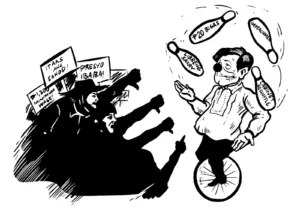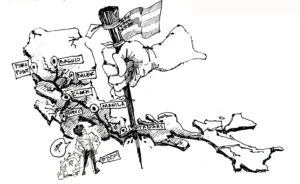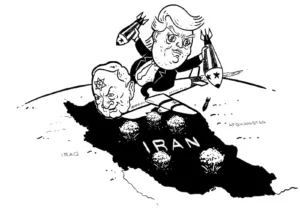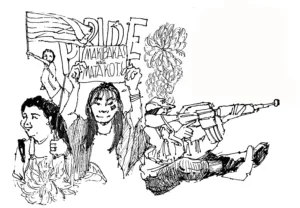By Irina Malenko I June 20, 2021
I have a great honour of reviewing Ka Joma’s newest book on the Philosophy of Marxism Leninism and Mao Zedong‘s Thought.
It is a very remarkable book in the sense that it is a collection of his works on this topic over the last 50 years which is a very substantial period of time.
It’s important first of all because of the growing importance of the revolutionary theory for the international communist movement. There are far too few authors these days who properly and deeply develop revolutionary theory based on our modern conditions, because unfortunately many younger comrades in different countries still lack the deep theoretical knowledge of the classic works. In this sense, this book could not be more timely. We live in the period of great changes, we can feel it every day in our own lives. Ka Joma stressed in his various works of the last few years that our time is the eve of the great revolutionary changes for the whole mankind, the time of the rising tide, and we should be well prepared for the tasks that we will have to complete, and it is our duty to acquire the necessary knowledge in order to defeat the decaying capitalist system and to build the better world. And I believe this book is one of the excellent instruments for us to achieve this knowledge that we need so badly in order to become able to do this. As professor Sison correctly states in this book, “Having the materialist-scientific outlook and applying dialectical materialism facilitate the understanding of all matters and the solution of problems in the revolutionary process.” And it is really essential for us to master it.
There are works collected in this book which are aimed at audiences with various level of knowledge of the revolutionary theory – from the basics to in depth analysis of various classic Marxist works. If we start from the basics, I can mention such works as (Basic Principles of Marxism-Leninism: A Primer 1981-1982 and On Proletarian Stand and Outlook: Introduction to Marxism-Leninism-Maoism, 2021) and of course if we look at in-depth analysis of such classic works as On the Origin of the Family, Private Property and the State by Friedrich Engels , The Discussion of Anti-Dühring by Friedrich Engels, and The General view of Lenin’s theory on Modern Imperialism – “ – all of these works are excellent example of how the revolutionary theory should be not just studied, but also developed in our modern times . It is about Reviewing and Further Developing Basic Principles, as Professor Sison correctly states.
This book also gives us as foreign comrades a good guidance in the history of the revolutionary movement in the Philippines, in the context of Marxist-Leninist-Maoist teachings. It is important not only for the young people in the Philippines themselves, but also for comrades in other countries as it allows us to learn from each other’s experience of struggle. Comrade Sison’s works clearly show us how revolutionary theory is applicable in practice . I think for our Eastern European comrades it will be of particular importance as not many of us unfortunately have a detailed knowledge of the history of the revolutionary movement in the Philippines. I shall mention that the experience of the Rectification movement is particularly interesting and important for our comrades in Eastern Europe today because unfortunately within the revolutionary movement in our part of the world there are still a lot of divisions and a lot of ideological confusion today.
In Eastern Europe, people of my age and older, because we studied Marxism Leninism at universities, a lot of people think that we know it all, but in fact, quite often our knowledge is somewhat superficial and not properly tied to practice, so I think we have a lot of work to do in Eastern Europe in relation to this. And in order to complete this work, we deeply need such books as this one.
Also very important for us are such works as On the Question on Mao Zedong Thought/Maoism (2019), because in Eastern Europe we simply lack the knowledge of Mao’s works. We lack it very badly. Unfortunately, when it comes, for example, to Cultural Revolution in People’s Republic of China, most people who grew up in the USSR around that time, would only recall such things as “mass murder of sparrows” and other rather peculiar things, without knowing anything of the essence of this historical process. Comrade Mao’s works have been totally excluded from the Soviet curriculum on Marxist revolutionary thought, so for us, to hear about “the great contributions of Mao and the six components of Maoism” is something of a novelty.
The work “Tribute to the Great Communist Mao Zedong, 13 September, 1976” has rang a personal bell for me. I was 9 when comrade Mao passed away. I remember it so clearly, because it was in September, and the school year just started. At that time I didn’t know much about him, probably like young people in Europe don’t know about Stalin these days, except for some fake negative clichés).
In our school at that time a cynical joke was going around:
Умер Мао, умер Тито,
Леонид Ильич, а ты-то?
(Mao has died, and so did Tito,
Leonid Ilyich (Brezhnev), what about you?)
We were repeating it completely without thinking, but mainly because Brezhnev was mocked with it.
Relations between USSR and China at that time were perhaps at their lowest point. So, there was no opportunity for us to familiarize ourselves with his teachings.
In this sense, it is very important for us to realize now (better late than never!) what we are actually lacking by not knowing his works. As comrade Sison states in his book, we need to “underscore Mao Zedong Thought as the further development of Marxism-Leninism. We studied avidly Mao’s theoretical and practical contributions to philosophy, political economy, social science, rectification movement, people’s war, and the theory of continuing revolution in socialist society.” He speaks of the fact that “Maoism as the third stage in the development of the universal theory and practice of the revolutionary proletariat”- it is something that we need to reflect deep upon.
It’s actually only thanks to my Filipino comrades and to Ka Joma personally that I began to read his works. Thanks to you, I realize now that there is a need to break through the demonising of comrade Mao and this continuing dismissive attitude towards his works as it often still happens in Eastern Europe. We overcame this about Stalin, because his works were also not available to the general public in the USSR during the Brezhnev’s years. We can and should overcome this sort of attitude towards comrade Mao’s works as well. This will allow us to enrich our theoretical knowledge and also practical knowledge of how to apply this in the struggle, how to evaluate properly the mistakes of our own past that could have been prevented.
Soviet bureaucrat communists after Stalin were quite often arrogant and a bit chauvinistic, even though they d have denied it. Hence this attitude that only our Soviet theoretical works were correct, dismissive attitude towards works of comrades from other countries. Today we are paying the price, among other things, also for this attitude.
What I also find particularly inspiring in Ka Joma’s works, is that it’s always not just theory – it is also about this theory’s detailed application in practice. Here I can name such works as: Build the Bolshevik-type of Party and the Revolutionary Mass Movement, Marxism-Leninism-Mao Zedong Thought as Guide to the Philippine Revolution; Development, Current Status, and Prospects of Maoist Theory and Practice in the Philippines.
I was actually present at some webinars that you have held recently, on works of Engels and on dialectical and historical materialism. And in a way, it brought me back to my student days in the Soviet Union, I must admit that during those days, I found particularly challenging to understand the concept of dialectical materialism. But now, over the years, it became a lot more clear to me. Not only I began to understand it properly, instead of just trying to memorize things, but I also began to realize how essential this knowledge is for becoming a true revolutionary and for being able to see a clear path towards communist future.
Some of these works of Ka Joma are already translated into Russian and published in our Magazine which is called Contemporary or Marxism Today, it’s been ublished in the Ukraine, but in Russian language, it is an international magazine which is available in different countries and also online.
It is such works as Some Questions on Dialectical Materialism, Lenin at 150: Lenin Lives!, Significance of the Paris Commune of 1871 and its Relevance to the World Proletarian Revolution.
One of the most important and urgent tasks of the communist movement is the struggle against revisionism (just to give you an example, in Russia we have a very difficult situation now, we already had four main communist parties during the last 30 years, but now there are also splits and divisions within these four. I think many communists in our part of the world – because they lack this clear and concise knowledge of Marxist theory, they feel sort of lost. And without defeating our ideological opponents who pretend to be true revolutionaries and who try to saw a confusion among those comrades who are not soundly ideologically prepared, without defeating such revisionists, we can’t successfully march forward. So, in this sense, such works as Stand for Socialism against Modern Revisionism and On Trotskyites and other Slanderers , I think, are very important.
I think most of the works that are included into this book, are very important to translate into other languages. We already made a suggestion to publish a compilation of comrade Sison’s most important works in other languages, even several volumes of such works.
Maybe we in Eastern Europe should prepare a compilation of most important works of contemporary foreign comrades on the issue of how to build a Bolshevik’s type of Party. For example, we could take Ka Joma’s work Build the Bolshevik-type of Party and the Revolutionary Mass Movement and to publish it in combination with Ludo Martens’s “Party Of The Revolution”. Such publication would help us to vastly improve our ideological and political education, and to move us towards our mutual goal, and that is not just to explain the world around us, but also to change it.
I sincerely would like to thank Ka Joma for such an excellent book and I think all of us will be looking forward to read more of his books this year and the years ahead.
Thank you very much!











